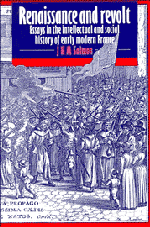Book contents
- Frontmatter
- Contents
- Acknowledgements
- Introduction
- Part I Humanism, stoicism, and interest of state
- Part II Sovereignty, resistance, and Christian obedience
- Part III Structures and fissures
- 8 Venality of office and popular sedition in seventeenth-century France
- 9 Peasant revolt in Vivarais, 1575–1580
- 10 The Paris Sixteen, 1584–1594: the social analysis of a revolutionary movement
- 11 The Audijos revolt: provincial liberties and institutional rivalries under Louis XIV
- Index
11 - The Audijos revolt: provincial liberties and institutional rivalries under Louis XIV
Published online by Cambridge University Press: 23 December 2009
- Frontmatter
- Contents
- Acknowledgements
- Introduction
- Part I Humanism, stoicism, and interest of state
- Part II Sovereignty, resistance, and Christian obedience
- Part III Structures and fissures
- 8 Venality of office and popular sedition in seventeenth-century France
- 9 Peasant revolt in Vivarais, 1575–1580
- 10 The Paris Sixteen, 1584–1594: the social analysis of a revolutionary movement
- 11 The Audijos revolt: provincial liberties and institutional rivalries under Louis XIV
- Index
Summary
CAUSES OF THE REVOLT
Although the Audijos uprising of 1664–7 mentioned briefly in recent surveys of peasant discontents, and although it has been the focus of a massive collection of published documents, its most interesting aspect has not been studied. The revolt coincided with the early years of Colbert's administration, a period of centralising étatisme, and it affected a number of small territories in the Pyrenees whose privileges and local institutions displayed considerable vitality. In the course of the rising these institutions did not always co-operate in defence of provincial immunities, but neither did governors and intendants always work together in their endeavours to assert the royal will. It is upon this clash of interests, especially in Béarn, rather than upon the details of the insurrection itself, that this paper is focused.
The revolt was led by a petty gentleman of Chalosse, Bernard d'Audijos, who had served as a youth in a royal regiment at the end of the Fronde, when Henri de Baylens, marquis de Poyanne and lieutenant-general in Béarn and Navarre, had opposed Condé's German commander, Balthazar, in Gascony. Poyanne and other nobles of the sword were accused by the intendant of inaction or complicity during the guerrilla war waged by Audijos. In this, and in other respects, the revolt followed an established seventeenth-century pattern.It was provoked by the attempt of the central government to strengthen or assert its fiscal powers; it attracted the sympathy and sometimes the support of local society as a whole; and it was fought by peasantry whose villages suffered from the reprisals of the king's dragons.
- Type
- Chapter
- Information
- Renaissance and RevoltEssays in the Intellectual and Social History of Early Modern France, pp. 267 - 292Publisher: Cambridge University PressPrint publication year: 1987



